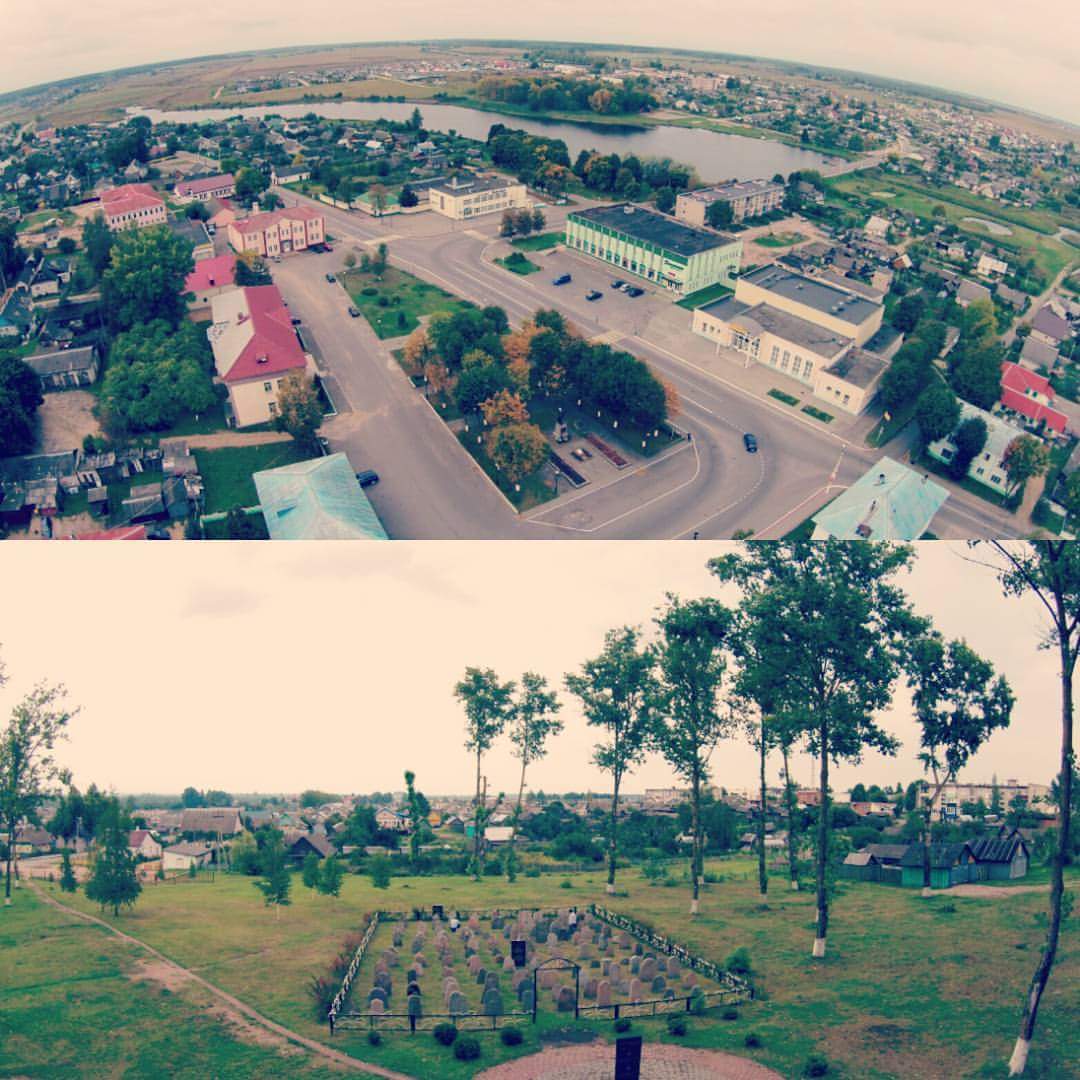 54º 53', 28º42'. Alternate name: Dokshitz-Parafianow, Bel: Докшыцы, Rus: До́кшицы, Polish: Dokszyce., 200 km (124.27 mi) SW of Vitebsk and a kmfrom the source of the Berezina River. 2010 population was 6,600. The town is first mentioned in a document of Grand Duke Vytautas dated 1407 which refers to tributaries called "doxyczahe." After the Second Partition of Poland in 1793, Dokshitsy became part of the Russian Empire, forming part of the Minsk guberniya; in 1795 it was briefly made a city before losing a portion of its territory and reverting to village status two years later. During the War of 1812 it was overrun and destroyed by the French. During WWII, the Red Army occupied it in September 1939 and Nazi Germany on July 9, 1941. The Germans destroyed the city and set up a military garrison. It was retaken by the Red Army on July 2, 1944.
54º 53', 28º42'. Alternate name: Dokshitz-Parafianow, Bel: Докшыцы, Rus: До́кшицы, Polish: Dokszyce., 200 km (124.27 mi) SW of Vitebsk and a kmfrom the source of the Berezina River. 2010 population was 6,600. The town is first mentioned in a document of Grand Duke Vytautas dated 1407 which refers to tributaries called "doxyczahe." After the Second Partition of Poland in 1793, Dokshitsy became part of the Russian Empire, forming part of the Minsk guberniya; in 1795 it was briefly made a city before losing a portion of its territory and reverting to village status two years later. During the War of 1812 it was overrun and destroyed by the French. During WWII, the Red Army occupied it in September 1939 and Nazi Germany on July 9, 1941. The Germans destroyed the city and set up a military garrison. It was retaken by the Red Army on July 2, 1944.
Monument in the memory of 3000 Jews of the ghetto killed in 1942 was erected in 1968.[March 2009]
information about cemetery restoration. Parafianov, 12 km away that used this cemetery. The villages of Voznvoshchina, Uskrom'ye, and Karolina may also have used it. The cemetery was destroyed in 1965 and made into a park. G. N. Portyanko of the Dokshitsy government states that, There are headstones at the far end of the park. A 1942 mass grave is located in a ravine next to the site and marked. Another mass grave on a piece of abandoned land behind a local grocery store in Parafianov is marked. photos, map, and information about the cemetery and town. [December 2006]
Dokshitzy Jewish cemetery restoration project in 2008 re-erected 134 tombstones on the Jewish cemetery grounds destroyed in 1965. Most of the stones had been buried under a road for four decades. photos of gravestones. photo of condition of the Jewish cemetery in Dokshitsy and the sites of the Shoa both in Dokshitsy and in nearby Parafianov. (photo album.) These towns, and nearby villages shared the cemetery.Also see a sketch showing the relative positions of the Jewish cemetery in Dokshitsy, Belarus, and the Shoa massacre site directly across the street. [March 2009]
Holocaust Memorial Unveiled in Dokshytsy."The unveiling ceremony for a Holocaust memorial was held Friday [May 23, 2008] in Dokshytsy, a city of 7,500 residents in the north of Belarus. The memorial is located at an old Jewish cemetery where Jews were massacred by Nazi troops during World War II.The commemoration was organized by the local government; Voluntas, a Belarusian-registered international charity; and US citizen Aaron Ginsburg. Fourteen relatives of the massacre's victims arrived from the United States, Russia and South Africa to attend the ceremony, Franklin J. Schwarz, director of the Voluntas international relations department, told BelaPAN.The park on the territory of the cemetery was renovated with donations from Jewish communities abroad and funds provided by the local government, Mr. Schwarz said. Aleh Pinchuk, chairman of the Dokshytsy District Executive Committee, initiated the renovation project, which included straightening up old gravestones, building a fence around the cemetery and putting up black marble stones and a memorial slab bearing an inscription that reads, in Belarusian, "Remember the Jewish life that once teemed here," Mr. Schwarz said.Ceremony participants visited the Dokshytsy general education school to thank its students for taking care of the park and the cemetery. They also expressed gratitude to local residents for honoring the memory of their ancestors and enabling the story of the Jewish community in Dokshytsa to become part of Belarusian history.On May 23, 1942, most of the Jewish residents of Dokshytsy were herded into a ravine near the cemetery and shot dead." [March 2009]
photos. cemetery location: st. Пионерская Pionerskaja [February 2010]
Information for both cemeteries and photos of 134 gravestones. [April 2010)
Friends of Dokshitzy. [July 2013]
US Commission for the Preservation of American Monuments Abroad project. [Sept 2014]
Photo courtesy Facebook/Andrei Burdenkov [February 2016]
